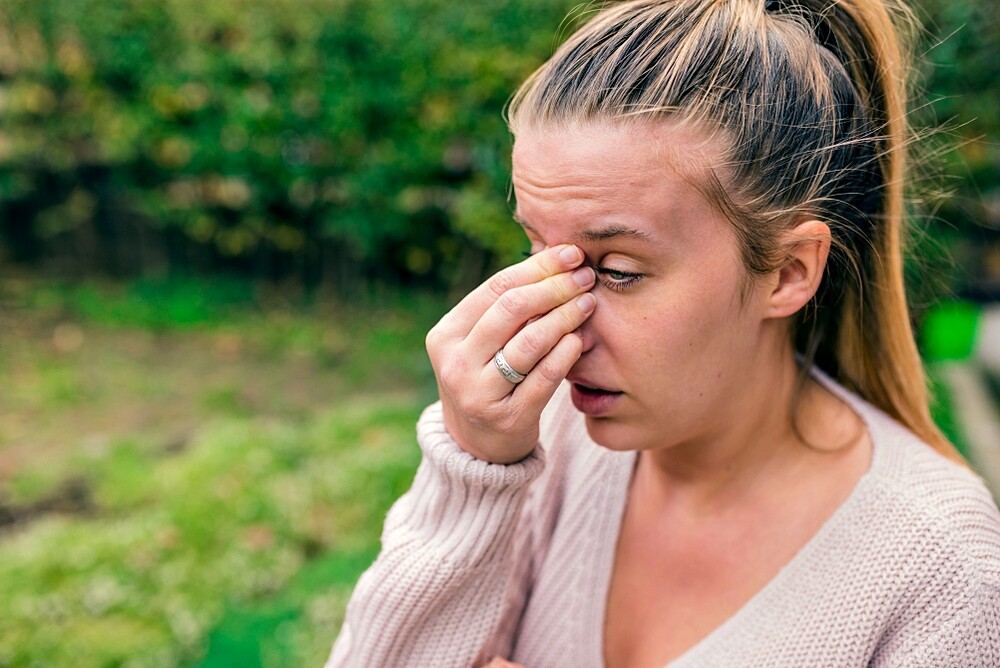A sinus infection often develops from a cold and causes, among other things, severe headaches. This is how you get rid of the complaints!
What is frontal sinusitis?
In a sinus infection, the swollen nasal mucosa produces more secretion than usual. This then closes the connecting passages between the nasal cavities and the frontal sinuses, causing the mucus to accumulate, especially in the frontal sinuses. Typical symptoms are stabbing headaches, which can occur on one or both sides, as well as fever and fatigue.
Sinusitis is a form of sinusitis and can be both acute and chronic. There are no significant risk groups – it can occur at any age. Often, sinusitis develops from a simple cold after the nose has been infected by viruses or bacteria, and is most likely to be treated by reducing the swelling of the mucous membrane.
Causes: Acute or chronic sinusitis
The acute and chronic forms of the disease are distinguished by their causes:
- Acute sinus infection: The nose is attacked by pathogens such as viruses or bacteria, in some cases fungi or an allergy are also the trigger.
- Chronic frontal sinusitis: Here there are often anatomical causes, e.g. polyps, a crooked nasal septum or a chronic aeration disorder of the frontal sinus. Chronic sinusitis can be recognised by the fact that the symptoms last for more than twelve weeks.
Symptoms of frontal sinusitis
A sinus infection can cause symptoms that are also typical for a cold. These include:
- Severe stabbing, biting or pulsating headache behind the forehead
- Severe cold, often purulent
- Pain when chewing
- Olfactory sense diminishes
- Cold complaints like fever, exhaustion and tiredness
- Conjunctivitis (when the inflammation spreads)
Important: The severe headaches are mainly caused by the acute sinusitis. In the chronic variant they are less severe or in some cases do not occur at all.
Treatment: What helps with frontal sinusitis?
The aim of the treatment is to ventilate the sinuses. To do this, the secretion must flow out of the paranasal sinuses and the frontal sinuses. It is also important that the mucous membrane in the nose swells again. Appropriate nasal sprays and expectorant medication are suitable for this purpose. If bacteria are the cause of sinusitis, the doctor can also prescribe antibiotics. In some cases, surgery is also necessary.
Home remedy for sinusitis
In addition to the classic treatment by the doctor, home remedies against sinusitis can also help. These include:
- Inhale: Preferably with thyme (has an antibacterial and expectorant effect) or chamomile (has an anti-inflammatory effect).
- Nasal rinses: Nasal rinsing with a saline solution makes the nasal mucous membrane swell more easily and transports pathogens of the infection out of the body.
- Drink a lot: To make the viscous mucus more fluid and to make it easier to drain, it is important to drink a lot of water – at least two litres should be drunk. Herbal tea is also fine.
You’ll find more sinusitis home remedies here.
Blowing your nose properly in case of sinusitis – you should pay attention to this!
Even if it sounds unpleasant at first – in case of a sinus infection we should not blow our nose all the time, but rather pull up our nose and only carefully dab off dripping secretions. When blowing, the narrowed opening of the nose creates a pressure that pushes the mucus back into the sinuses. On the other hand, when you pull it up, there is a negative pressure which pulls it out of the sinuses and lets it run into the stomach. There the stomach acid can kill the pathogens.

